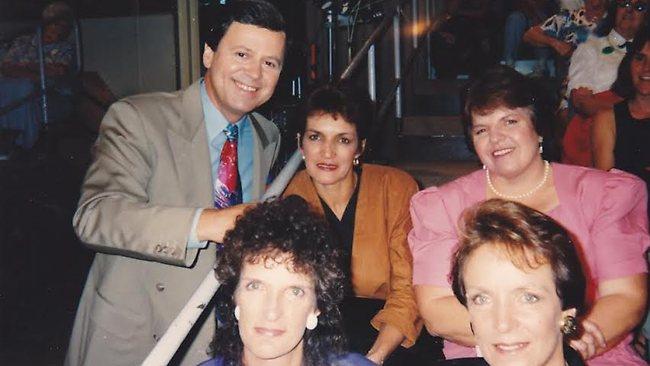Queensland murder cold case: Doris Harbottle killed in hotel room Fortitude Valley
DORIS was a lonely woman. So when a man calling himself 'Burton' approached her in a hotel bar and struck up a conversation, she ended up leaving with him. It would be a fatal mistake.

News
Don't miss out on the headlines from News. Followed categories will be added to My News.
FOR years she'd written letter after letter, battling red-taped government departments for scraps of information.
Her mother was Australian. She’d been 22 and single. Domestic duties - scant details that left Merle Hoger always seeking more.
“Your birth mother comes from a large metropolitan area,” one read.
“We are not able to give you any further information.”
Later, Merle was allowed information that she had an older sister. She’d always wondered what it would be like to have a sister. A friend, who was part of you.
The sister had not been given up for adoption. But Merle’s voracious letter-writing would also reveal she had two younger sisters. They’d also been adopted.
It was 1991, a decade after her campaign began, when Merle was finally given access to a name: Doris Beatrice Harbottle.
Her mother.
With shaking hands, she grabbed the White Pages and called the only Harbottle listed.
A man answered.
With that call, Merle gained a family – and lost her mother.
Doris was dead.
It had been five years since a cleaner walked into one of the second floor rooms of the Royal George Hotel in Fortitude Valley and discovered 56-year-old Doris on the bed.
She’d been bashed and strangled. Her left eye was bruised and swollen. Her lips were bloodied. There were bruises on the back of her head. Three small puncture wounds dotted her face.
A pillow slip stuffed in her mouth had kept her screams from other guests and her hands had been bound with a reddish-pink tape.
Police would later identify it as the same tape used by lawyers and government workers to bind documents.
The man who’d answered the phone that day had been a cousin of Merle’s. Doris and her family had been estranged for years, he explained. But he would be able to help her track down her sister Ann.
“He said to me that my mother was not alive,” Merle said.
“I had always considered that that might have happened. But then he said she’d been murdered.”
Relatives described Doris as a lonely woman who would spend hours watching the television in her Spring Hill flat.
She would often visit the Royal George Hotel for a few drinks in the afternoon.
That’s where she was on the afternoon of November 13, 1986, sitting at a table in the lounge bar, when she was approached by a man in his 20s.
The man had paid cash that afternoon for room 21, booking it under the name “Burton”.
He had no luggage with him. Wearing a blue shirt, much like those worn by Telecom, Railway and Fire Brigade employees, the man sat in the bar drinking bourbon and Coke.
Witnesses would later describe him as having light brown, curly, medium length hair. He was unshaven with a tattoo on his right forearm. Two of his upper teeth were badly discoloured. He spoke with an Australian accent.
They saw him approach Doris at her table. Later, they were spotted outside.
The man came back to the hotel about 9.30pm alone.
“It was a senseless murder,” police said at the time.
“She was just a harmless lady who never caused any problems. A barmaid described her as one of our `lonely ladies’.”
The four sisters have now been reunited. Merle believes Doris would not have been in a position to raise her children. And as a young, single mother, would have been under some pressure to put her babies up for adoption.
Only Ann, the eldest, had ever met their mother. Raised by their grandmother, Doris’ firstborn saw her only infrequently.
But it would be Ann who would have to identify Doris’ body.
“How could anyone be a human, even call themselves one, and do something like that to my mother – or anyone?” she said in an interview in 1992.
“Has that person killed again? Will he strike again?”
Police considered whether Doris had been murdered for her pension money. She’d collected it the day before.
Her black handbag, containing personal papers and the $200, was never found.
Public appeals hoping to identify the mystery “Burton” led to nothing.
Later, a $250,000 reward was offered for information leading to the apprehension and conviction of her killer.
But any leads led to dead ends.
Merle believes her mother would have been a different person had she reunited with her daughters before her death.
“She was a lonely person. If she’d met us, I would have accepted her. I don’t judge people for their pasts,” she said.
“I’m sure she wanted to know how we were going.
“Any mother, even one with faults, would want to know how those girls they gave birth to were going.”
She said she hopes that even now, 28 years to the day that Doris was last seen alive, it is not too late for answers.
“They may be dead, they may still be alive. I might even know them,” Merle said.
“If they are still out there, we need to bring them to justice.
“You hear about other murders being solved after 20, 30 years. Maybe this can be one of those.”
Anyone with information should call Crime Stoppers on 1800 333 000.

